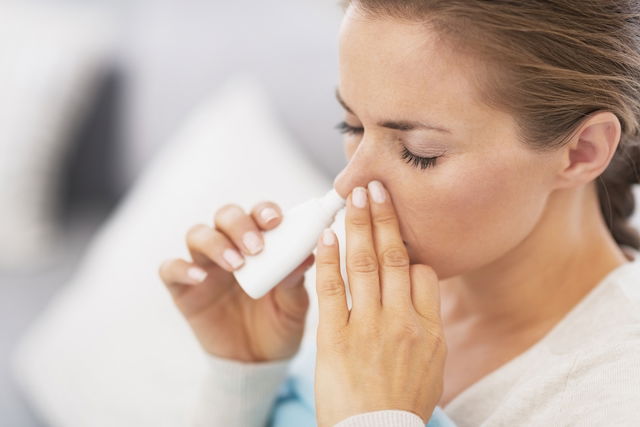Allergic rhinitis medication, antihistamines or corticosteroids, help to relieve the symptoms like a blocked or runny nose, itchy nose, itchy eyes or constant sneezing. These medications are available as sprays, drops or tablets.
These remedies should be used as directed by a doctor or allergy specialist, who can indicate the best treatment on a case-by-case basis, considering the patient's age, causes of rhinitis and severity of symptoms.
In addition to rhinitis medication, treatment can also be compliment by home remedies, such as inhaling eucalyptus essential oil or drinking ginger and garlic tea, for example, to help relieve symptoms more quickly.

Medications for rhinitis
Some medications for allergic rhinitis that your doctor may prescribe include:
1. Saline solutions
Saline solutions in drops or spray form contain 0.9% sodium chloride (a type of salt) and sterile water. It works by eliminating irritants and allergens in the nostrils, and while also thinning out nasal secretions to help relieve blocked and runny nose.
Most saline solutions can be purchased at the pharmacy without a prescription.
You can also use saline solutions to perform nasal irrigations - learn more about how to perform a nasal irrigation at home.
2. Antihistamines
Antihistamines are anti-allergy medications that help relieve the symptoms like an itchy nose, itchy eyes, runny nose or constant sneezing. They act by blocking the action of histamine, which is the substance produced by the body responsible for the allergic response.
The antihistamines that can be used orally and are usually prescribed by a doctor are:
- Dexchlorpheniramine maleate tablets, lozenges or syrup
- Loratadine tablet, syrup or drops
- Desloratadine tablet, syrup or drops
- Fexofenadine tablet or syrup
- Cetirizine capsule, tablet or drops
- Hydroxyzine syrup or tablet
- Levocetirizine drops or tablet
- Promethazine tablets
In addition to oral antihistamines, the doctor may also prescribe nasal sprays with antihistamines, such as azelastine or dimethindene maleate. They are applied within the nostril 2-3 times a day to help relieve the symptoms of allergic rhinitis more quickly.
Antihistamines should only be used as prescribed. They are not indicated for children, pregnant or breastfeeding women unless recommended by a doctor.
3. Decongestants
Oral decongestants such as pseudoephedrine act by causing vasoconstriction, leading to a decrease in blood flow in the nasal mucosa. This reduces the entry of fluids into the nose, throat and sinuses, which reduces inflammation of the nasal membranes and mucus production. Learn more about how pseudoephedrine is taken and the side effects associated with it.
Decongestant sprays or drops such as oxymetazoline and phenylephrine are used in the nose, and also cause vasoconstriction, leading to a rapid decongestant effect. However, excessive use of these decongestant sprays can cause rebound nasal congestion, which is when the nasal mucosa increases mucus production because it realizes that secretions are decreasing. This can ultimately worsen allergic rhinitis.
4. Corticosteroids
Corticosteroids in nasal spray form, such as beclomethasone, fluticasone, mometasone or budesonide, act by reducing inflammation and swelling of the nasal mucosa, relieving the symptoms of rhinitis. These are especially effective when used regularly.
In general, nasal spray corticosteroids are the most suitable medications for allergic rhinitis because they quickly relieve rhinitis symptoms and have few side effects compared to oral corticosteroids. They are also considered to be more effective than antihistamines.
These corticosteroids should only be used as prescribed by your doctor.
5. Antileukotrienes
Antileukotrienes, such as montelukast, act by reducing inflammation of the nasal mucosa, relieving symptoms of allergic rhinitis like nasal obstruction, sneezing, itching and a blocked or runny nose.
Montelukast can be used in tablet form by adults or children over 2 years of age, or in powder form by adults and children over 6 months of age. The dose and length of treatment vary according to age and the severity of allergic rhinitis symptoms, and should always be used under medical supervision.
Antileukotrienes should not be used during pregnancy or breastfeeding, unless indicated by a doctor.
Medications for allergic rhinitis in children
Medication for allergic rhinitis in children should be prescribed by the pediatrician according to the child's age and the severity of the symptoms.
Generally, the antihistamines prescribed by the doctor are in syrup form, while decongestants are prescribed in drops so as not to damage the nasal mucosa.
Doses for medications as well as treatment duration should be prescribed by a pediatrician.
Home remedies for allergic rhinitis
A good way to complement medical treatment for allergic rhinitis is to drink ginger tea with garlic or inhale eucalyptus essential oil, as these help to reduce inflammation in the airways. Check out other ways to stop a runny nose using natural remedies.
The use of these, or any other natural remedy, should not replace the medication prescribed by a doctor. They should only be used to complement medical treatment.
Other considerations include cleaning your environment as much as possible, cleaning your nostrils and avoiding contact with allergens as much as possible. If these measures are not effective, you should see a doctor to recommend the best treatment.
